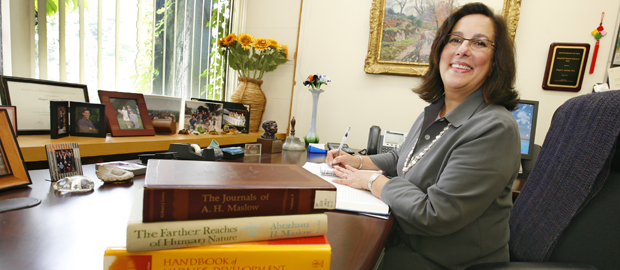New Brandeis research consortium promotes healthy aging through active living
Professor Margie Lachman and a team of researchers aim to get middle-aged and older adults off the couch
 Photo/Mike Lovett
Photo/Mike Lovett Most adults agree an active and engaged lifestyle is essential for good health. They’ve heard about the many benefits of physical activity, including better heart and respiratory health, greater bone and muscle strength, and improved cognitive function. Many know that exercise can also lower the risk of type 2 diabetes, cancer and depression.
Yet only a small percentage of middle-aged and older adults in the United States engage in regular physical exercise. With $1.5 million from the National Institute on Aging, the just-opened Boston Roybal Center for Active Lifestyle Interventions (BRC) aims to change this sobering statistic.
A research consortium of five universities, the Brandeis-based BRC will be led by Minnie and Harold Fierman Professor of Psychology Margie Lachman over the next five years. The center will develop, test and promote healthy aging strategies, especially among sedentary adults at high risk for poor health outcomes. The goal is to encourage adults to incorporate more activity into their everyday lives in the context of their work, family and leisure time.
“Physical activity is a promising non-pharmacological, non-invasive and cost-effective way to promote health,” says Lachman. “Even a modest increase in physical activity, along with a reduction in sedentary behavior, can have far-reaching health benefits.”
The BRC consists of an interdisciplinary team of researchers from Brandeis, Northeastern University, Boston University, Hebrew SeniorLife/Harvard Medical School and Boston College. The center will work with community organizations to implement healthy aging programs among diverse and low-income populations.
Initially, the center will fund five pilot projects across the participating institutions that explore innovative approaches to increase physical activity and decrease sedentary behaviors. The projects will investigate remote monitoring technology, such as motion sensors; emotion regulation strategies; personalized wellness programs and web-based peer exercise coaches.
“Ultimately, we will apply what we learn from the pilot projects to develop the most effective lifestyle programs and policies that improve physical, cognitive and psychological health,” Lachman says.
The Roybal Centers, named for former House Select Committee on Aging Chair Edward R. Roybal, were authorized by Congress in 1993 to apply laboratory research findings in everyday settings to improve health and well-being. Today there are 13 centers; the BRC is one of two new ones funded by the National Institute of Aging this year.
Categories: Humanities and Social Sciences, Research





